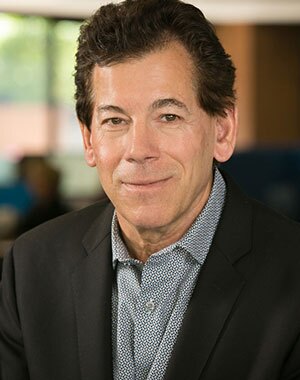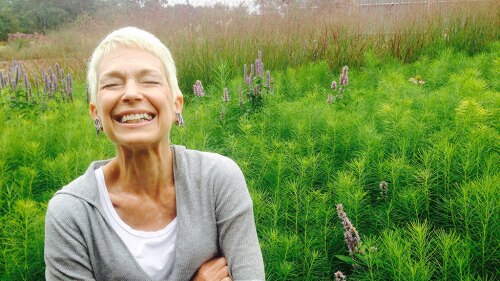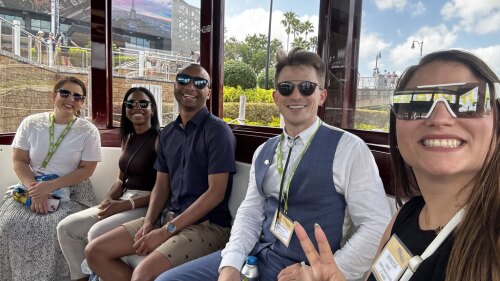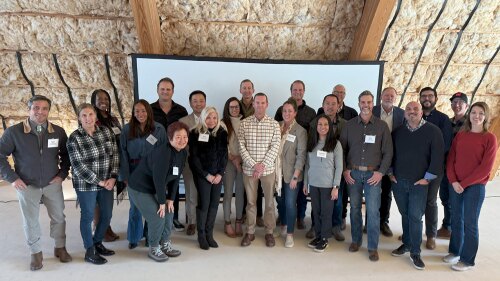Bruce Etkin, one of ULI’s foremost leaders, is making a significant gift to support the Institute’s efforts to attract the next generation of land use professionals and increase diversity among those entering the real estate industry.
Etkin, chairman of Etkin Johnson Real Estate Partners in Denver, is giving $1 million to create the ULI Etkin Scholars Program. The goal is to strengthen relationships between colleges and universities and ULI by connecting district councils with graduate and undergraduate students whose studies are related to urban planning, design, or development.
The program will debut early in the 2021–2022 academic year and initially will be provided through five district councils—ULI Atlanta, ULI Baltimore, ULI British Columbia, ULI Charlotte, and ULI Colorado. In its first year, 80 to 100 students will participate. Students will be identified for participation by the district councils and will receive free ULI student memberships and free access to all district council programming, special events, networking, and learning opportunities throughout the academic year. A major goal of the program is to expand to 20 district councils over the next five years.
Through the ULI Etkin Scholars Program, students will gain a better understanding of the interdisciplinary nature of the real estate industry, preparing them to be more effective and successful in their careers, whether directly or indirectly related to land use. In addition, the program aims to improve communications between district councils by encouraging them to share best practices as they cultivate university partnerships and include students in their activities.
“We are grateful for the generosity and lifelong commitment Bruce has shown ULI,” says W. Edward Walter, ULI global chief executive officer. “Bruce is one of our most highly engaged members, and we thank him for investing in the next generation of leaders of ULI.”
The ULI Foundation is in the quiet phase of a $100 million capital campaign, titled “Our Cities, Our Future.” Developing the next generation of diverse industry leaders is one of the campaign’s three key areas of focus, along with climate change and equitable housing.
“Bruce’s gift represents a significant step forward in our campaign to secure ULI’s future,” says ULI Foundation campaign co-chair Douglas Abbey. “We appreciate his leadership and generous spirit—and we look forward to making his vision for the ULI Etkin Scholars Program a reality.”
The Etkin Scholars Program is modeled after ULI Colorado’s highly successful Etkin Johnson Student Scholars Program, initiated in 2014 with support from Etkin.
“Through the program, a larger and more racially and ethnically diverse group of students is being introduced early on to the industry, with possibilities for internships and jobs,” says ULI Colorado executive director Michael Leccese. “Students have an opportunity to meet with local ULI leaders—many who have come from the same university programs as the students—and make contacts that can help them build careers.”
Etkin is on the ULI Foundation Board of Directors and a member of the Foundation’s James Rouse Society and the James J. Curtis Society. He recently spoke with Urban Land about the importance of introducing the best and brightest young minds to ULI and keeping them engaged with the Institute.
The application to the ULI Etkin Scholars Program is open now at uli.org/etkinscholarsapp. Login with your ULI credentials or Create a free ULI account to apply. Spots remain open and the application will be open for rolling admission through Friday, November 5, 2021. Contact [email protected] to learn more about participating in this program.
Why do you believe it is important to introduce ULI to university students?
ULI is a diverse organization. It consists not just of real estate developers, but investors, urban planners, architects, engineers, technocrats, transportation specialists. ULI members represent a variety of disciplines. Similarly, this program is open to all the disciplines available through a college and university environment—not just students in real estate schools, but those in the engineering schools, architecture schools, business schools—students who are not on a real estate track but might be interested in real estate. Even if a student becomes a civil engineer, by being introduced to ULI that student will want to network with people at ULI and eventually have leadership positions at ULI. It’s an opportunity for students who are interested in the urban fabric to learn from professionals who care about and are shaping the urban fabric.
What can ULI offer that they cannot get anywhere else?
A diversity of ideas. I graduated as an engineer from the University of Colorado and was not initially involved in real estate. But more than 30 years ago, I found myself seeking it out after I was invited to speak to a group of ULI members. It was an experience that gave me access to people who could be potential clients, potential partners, and mentors.
I see the Etkin Scholars Program as a way for me to give back to ULI—to provide an opportunity for mentorship and multidisciplinary thought to students before they focus on advancing their careers in a narrow way. To keep students engaged, the program allows them to continue their involvement in ULI for a significantly reduced price for two years after they have graduated. We want to make it easy for them to stay with ULI as they start their careers.
How do you see involving students at the local level as being the most effective way to provide them with a ULI experience?
I believe we can reach more students by getting them involved at the local level with district councils, where they are able to experience the programming and networking that distinguishes ULI without traveling long distances to attend events such as national meetings. I want the program to help as many students as possible, and it is more cost-effective to do this through the district councils.
The sponsorship covers costs to attend all district council programming so students will not be limited by their economic ability to participate. And the gift stipulates that to the extent possible, district council programming should be made available virtually to provide easy access for students at different schools who may not be able to attend in person. The point is to make the program highly efficient and accessible to build student attendance and participation.
The issues ULI is involved in, such as increasing affordable housing, improving community sustainability and resilience, and increasing diversity within the industry, are issues that resonate with the next generation of land use professionals.
How might their approach to these issues expand or build on ULI’s leadership in these areas?
Cities are facing new issues they have never faced before. For instance, the sharing economy is one example of a phenomenon that has freed up commercial space, with car sharing and ride sharing decreasing the need for large parking structures. The pandemic is another example, causing us to rethink how much commercial space—particularly convention space—we really need. While I believe in-person meetings are important, there will continue to be a demand for virtual content now that people have been convening virtually for a prolonged time. Online learning and online networking will remain quite important. As a result of all the changes in how people work, learn, interact, and get around, we will need fresh ideas and solutions on how to redevelop and use obsolete and underutilized space.
Young people are looking at these issues from a different perspective [than previous generations], and their ideas will be much broader in terms of solutions. Providing them opportunities to network on a personal level with district council members will allow them to share their ideas and thoughts with more senior members of ULI.
This program appears to be an excellent opportunity to expand ULI’s tradition of knowledge sharing, being mutually rewarding for those who mentor as well as those who are mentored. What are your views on this?
I think mentoring at the local level is the most effective approach because a local mentor can introduce the students to local professionals in the industry, and they can meet with a local mentor on a regular basis. That is much more meaningful than mentoring at the national level, where the students might meet with their mentors twice a year at major meetings. It’s challenging for both the mentor and those being mentored when they live in different cities.
This program allows students to experience all the ways ULI members share their expertise, such as observing TAPs [technical assistance panels] convened by district councils or participating in project tours. They will be able to see local developments and meet the professionals who have supported the developments and are local leaders in the real estate industry. The success of the ULI Colorado program has convinced me of how beneficial it is to get students involved in ULI through district councils.
What is your measurement of success for this program?
My hope is that success in the four cities we are starting with will inspire ULI members in those cities to support the local programs with a multiyear commitment or an endowment to keep the momentum going. We can then use the funds I provided to prime the pump for programs in other cities. For instance, a substantial member gift could be tied to a naming opportunity. Offering people the opportunity to name a local program after themselves or their companies in return for a generous commitment would be a great way to supercharge my initial gift to the Foundation.
I am very excited about the potential of this program to help shape ULI’s future. It is an excellent way for ULI to cultivate new leaders and attract the best and brightest to our industry.
TRISH RIGGS, a public relations consultant and freelance writer with Keadle-Riggs Communications, was a senior vice president with ULI from 2005 to 2019.





